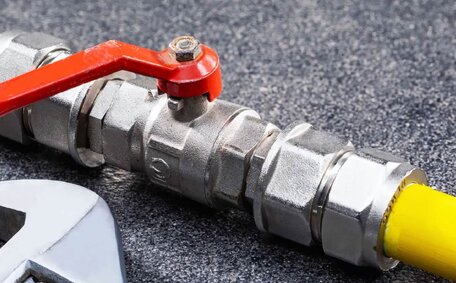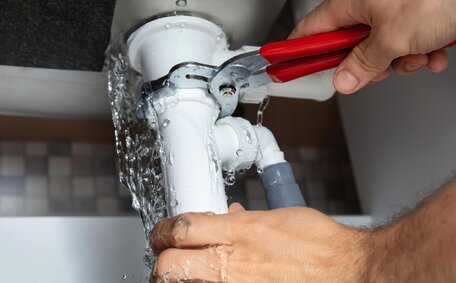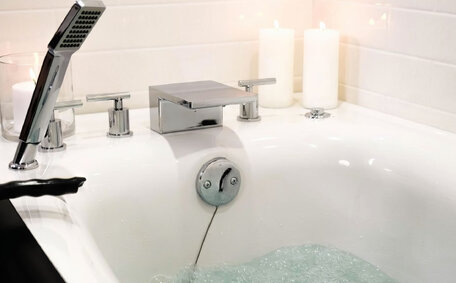What Makes a Hot Water System Efficient
The efficiency of a hot water system is determined by how well it converts energy into hot water. The key factors that determine efficiency include:
- Thermal performance - How well insulated the system is, reducing the energy used by minimising heat loss
- Energy consumption - The amount of energy required from sources such as electricity, gas, and solar to heat water
- Energy factor (EF) rating - A measure of efficiency with higher numbers indicating better performance
- Uniform Energy Factor (UEF) - A more accurate evaluation standard that provides a comprehensive representation of a water heater’s efficiency under real-world conditions
The most efficient systems harness advanced technologies to optimise heat transfer and reduce dissipated energy, resulting in lower running costs while satisfying household hot water demands.
Typical hot water systems range from electric gas to pure electric models, with heat pump and solar options varying significantly in energy consumption. By opting for a model with improved efficiency water heating capabilities, significant cost and environmental savings can be achieved as the heater uses much less energy over its lifetime.
Types of Hot Water Systems and Their Efficiency Ratings
Gas Storage Hot Water Systems
A gas hot water system heats water in an insulated tank, making it a preferred type for many households. Gas hot water systems typically display their gas energy rating as:
- EF Ratings: 0.55 to 0.85
- Uniform Energy Factor (UEF): 0.7 to 1.0
Better insulation in gas water heater systems reduces standby heat losses, enhancing efficiency.
Electric Storage Hot Water Systems
Electric hot water systems employ heating elements to heat a water tank. Standard electric hot water systems have energy ratings of:
- Energy Factor (EF): 0.8 to 0.95
- Uniform Energy Factor (UEF): 2.0 to 3.5
Heat Pump Hot Water Systems
Water systems use heat pump technology like heat pump hot water versions, which utilise refrigerant cycles and ambient air heat to warm water. Outperforming conventional gas or electric systems, heat pump models achieve significantly higher efficiencies:
- Energy Factor (EF): 2.0 to 3.5+
- Uniform Energy Factor (UEF): 3.0 to 5.0+
Furthermore, their advanced insulation substantially lowers standby losses.
Solar Hot Water Systems
Solar heat pump hot water systems harness the sun’s renewable energy to heat water. Well-designed solar systems are markedly more energy-efficient and can exceed:
- Energy Factor (EF): 1.5+
- Uniform Energy Factor (UEF): 5.0+
Performance is dependent on solar exposure and design features like evacuated tubes and anti-freeze protection, especially in colder climates.
Gas vs Electric vs Solar vs Heat Pump
Gas vs Electric vs Solar vs Heat Pump Hot Water Systems
There are different types of hot water system considerations when it comes to operating costs and environmental impacts:
- Gas Systems: Typically have lower running costs due to comparatively cheaper natural gas prices. However, they are less efficient and generate greenhouse gas emissions through gas combustion.
- Electric Systems: Can have higher operating expenses depending on electricity rates. Greenhouse emissions from electricity gas systems depend on whether the grid uses renewable energy sources.
- Solar Systems: Harness free and renewable solar energy but have higher upfront costs. They are ideal for sunny climates and environmentally conscious homeowners.
- Heat air pumps: Can cut energy bills dramatically using heat drawn from the surrounding environment. Considered an environmentally sustainable choice.
Considering climate, installation expenses, energy prices, and household needs allows homeowners to pick the best hot water system for their situation.
Tankless Water Heaters Gaining Popularity
Tankless water heaters, gaining popularity due to their energy efficiency benefits, provide a modern alternative to storage systems. Unlike traditional systems, a tank continuous flow hot water system can be designed to only heat water when needed, as seen in tankless heaters.
This on-demand operation means tankless systems have lower energy use as they do not have standby heat losses associated with maintaining stored water at temperature. As a result, they can be significantly more efficient, using less energy to satisfy the same water demand.
Tankless water heaters are well-suited to households with variable and intermittent hot water usage across the day. Their compact size and high-efficiency ratings also indicate suitability for small households not needing large stored hot water volumes. However, they may prove more expensive for households with simultaneous high hot water demands.
With rising energy prices, the installation of energy efficient tankless water heaters can help cut energy bills over the longer term. These systems use eco-friendly technologies that assist eco-conscious homeowners to lessen their carbon footprint.
How Energy Star Ratings Impact Efficiency
Star ratings, such as those from Energy Star, provide an accurate gauge for consumers to identify water heating systems that meet strict energy efficiency guidelines. To qualify for Energy Star certification, water heaters must achieve high energy efficiency ratings that meet or surpass government standards.
Electric storage tank system water heaters require a uniform energy factor (UEF) of at least 2.2, while gas storage tank models need a UEF of at least 0.64. Meeting these ratings ensures Energy Star certified systems are more effective at cutting energy costs than conventional electric models.
Choosing an Energy Star rated system leads to lower operating costs through reduced energy consumption over the heater’s lifetime. There are also environmental benefits from systems that curb fossil fuel usage and associated greenhouse gas emissions.
So when browsing water heaters, look for the Energy Star logo. It signifies a rigorously tested energy-efficient system that will save money while also being kinder to the environment.
Calculating Your Hot Water Energy Use
You can estimate your annual hot water energy use by following these steps:
- Find the suitable size hot water system’s tank or hourly delivery capacity in litres.
- Identify your system’s energy factor (EF) or uniform energy factor (UEF) rating.
- Determine the number of people in your household.
- Use the following formula:
- Energy the water heater uses = Tank size capacity or flow rate x EF or UEF rating x Household size x 365 days
- The result estimates how much energy your annual hot water energy consumption is in kilowatt-hours (kWh) for electric systems or megajoules (MJ) for gas systems.
As an example, A 275 litre electric hot water system with a UEF of 2.8 supplying hot water to a 4-person household would use approximately:
275 x 2.8 x 4 x 365 = 9,394 kWh per year
Compare your calculated usage against utility bills to determine if upgrading your water heater could reduce energy costs.
Choosing the Right System for Household Efficiency
When selecting the best hot water system, its important to pick the appropriately sized model to prevent wasted energy and maximise efficiency. Typically, the size of storage tank systems should be based on the number of bedrooms plus one. For instance, a 4-bedroom household would select a size system adequate for a 5-person tank.
Smaller households of 1-2 people can often meet demand with an instantaneous continuous flow gas system or electric heat pump. Larger families may require a larger split system storage tank to handle high volumes, opting for a gas, electric, or solar with electric or gas booster system.
In regions with strong sunlight, gas solar hot water systems paired with electric backup can provide a renewable and cost-effective option. Where sunshine is limited, heat pumps represent an energy efficient electric choice thanks to their high uniform energy factor (UEF).
When replacing an existing system, review utility bills and measure current hot water usage. This indicates whether the outgoing system was over or undersized for your household. Optimal sizing, allied with an energy-efficient model, ensures low operating costs throughout the lifetime of your hot water system.
Check available rebates on solar hot water or heat pump systems. Combined with the long-term savings from an appropriately sized and highly rated model,
Climate Considerations for Efficient Systems
Climate is an important factor when selecting an efficient hot water system. The optimal system for your home depends on the typical weather conditions in your area.
Sunny and Warm Climates
Solar hot water systems are particularly efficient in regions with plentiful sunshine and mild winters. The ample solar radiation allows the system to harness free renewable energy for much of the year.
Solar thermal systems with gas or electric boosters are a great option to maximise savings while ensuring reliable hot water year-round. Select evacuated tube or flat plate collector solar models based on winter temperatures.
Temperate and Colder Climates
In temperate to colder regions, heat pump vs electric hot water systems are very energy efficient. Unlike gas and electric systems, Heat pumps convert ambient warmth into heat, making it usable for the home.
Although air-sourced heat pump efficiency drops markedly below 7°C, Top models with freeze protection operate effectively in conditions down to -25°C.
Insulated gas condensing storage tanks also achieve excellent efficiency in cold weather. Tankless gas water heaters provide on-demand hot water but are best paired with recirculation in frigid conditions.
Remote Off-Grid Locations
For off-grid homes without mains electricity and gas, solar water heating is a highly cost-effective option.
Evacuated tube solar collectors backed up by gas LPG provide dependable hot water. Another fully renewable choice to consider is wood-fired systems.
In every climate, Selecting the right size for your household’s water system and improving insulation leads to efficient and customised hot water delivery.
Leveraging Rebates and Incentives
There are often rebates and incentives available when purchasing a new high-efficiency hot water system, which can help offset the upfront cost of the system.
Government Rebates
Many state and federal government rebate programmes provide discounts for installing certain types of energy-efficient hot water systems in residential homes. Common products eligible for rebates include:
- Solar hot water systems
- Heat pump hot water systems
- Gas tankless/continuous flow water heaters
Rebates typically range from $500 to $1000 based on factors like your location, climate zone, household energy usage, and the specific efficiency rating of the system. Be sure to research available Australian government rebates in your area before selecting a new water system.
Manufacturer Rebates
Certain brands also offer additional rebates if you purchase qualifying high-efficiency hot water systems from them. This may apply to heat pumps, solar systems, or gas condensing units above a specified efficiency level.
Manufacturer rebates can also offer a few hundred dollars in additional savings to amplify the discounts from government incentive programmes. Stack rebates from multiple sources to maximise savings on the upfront cost when upgrading your water heating.
Consider rebates as part of the overall return on investment calculation when purchasing energy-efficient hot water systems. The long-term savings from reduced energy bills can help save households thousands, making new systems surprisingly affordable.
Tips for Reducing Hot Water Energy Bills
There are several practical steps homeowners can take to lower their hot water energy costs:
- Install low-flow showerheads and tap aerators to decrease water use without compromising on flow for tasks like showering.
- Set the thermostat on your hot water system between 60-50C. Any higher causes excessive heat loss and energy use.
- Insulate hot water pipes and tanks to help reduce your energy consumption. Wrap pipes in insulation and use a water heater blanket to minimise standby heat loss.
- Take shorter showers of around 5 minutes. Limiting shower times curbs hot water use and the energy needed for water heating.
- Wash clothes in cold water cycles whenever possible. Only run hot washes for heavily soiled items.
- Have your system serviced regularly. A well-maintained hot water heater is the system most likely to operate with optimal heater efficiency.
Combining simple everyday conservation habits with Proper system insulation and maintenance can help keep your hot water energy bills in check.






